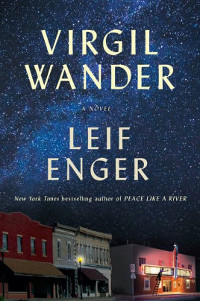Spotlight on Leif Enger's Virgil Wander | LibraryReads Author, October 15, 2018
 |
Photo by Robin Enger |
In the big-hearted, lusciously written Virgil Wander, Leif Enger’s first novel in ten years, the protagonist’s awakening to a new self after his car spins into gelid Lake Superior parallels the reawakening of the worn-out Minnesota town of Greenstone. Though Greenstone’s revival didn’t occur to Enger until halfway through writing and might just be Virgil’s perception, Enger linked the two events in a phone conversation with LJ by observing that “for the town to have reversal, an individual has to have a reversal.” And for Enger, Virgil’s reversal is rooted in something deeply personal.
“I needed renewal so badly myself,” Enger explains, “and I think I write out of what I most desperately need at the time.” Worried about his ailing parents and in-laws and about a novel that wouldn’t get written, Enger took to reading books that afforded him uplift, from Herman Melville’s Moby-Dick to the novels of Nick Hornby, Michael Chabon, and Anne Tyler. Soon he realized that “to start life over again in middle age, just as I was, Virgil had to speak in a voice of interior damage.”
 Enger’s sister had recently suffered a head trauma in a car accident and lost recall of her adjectives, as Enger eventually had happen to Virgil, and he once found her copying adjectives into a notebook. “It showed me what it is like to be at a place that was genuinely a new beginning,” he says. Furthermore, as Virgil reacquaints himself with the sights and citizens of Greenstone, “I was able to discover the town along with him.”
Enger’s sister had recently suffered a head trauma in a car accident and lost recall of her adjectives, as Enger eventually had happen to Virgil, and he once found her copying adjectives into a notebook. “It showed me what it is like to be at a place that was genuinely a new beginning,” he says. Furthermore, as Virgil reacquaints himself with the sights and citizens of Greenstone, “I was able to discover the town along with him.”
One character Virgil does meet for the first time is Rune, kite-maker and flyer extraordinaire, who has come from Norway to Greenstone in search of Alec Sandstrom, the son he never knew. A beloved local baseball legend who vanished over the lake in his plane, Alec typifies the “larger-than-life characters we all have in our orbit,” asserts Enger, and the very hopefulness of such mythologizing defines the ethos of his book. Aptly described by Enger as “out there as a human, lovely, eccentric, selfish, and selfless,” Rune is partly inspired by Will Yolen, whose The Complete Book of Kites and Kite Flying enthusiast Enger discovered in his high school library.
A movie theater owner, Virgil is himself partly inspired by a young owner Enger encountered in a “slump-shouldered theater with a mossy smell” in 1992 Florida, “a sort of zealot or mad scientist or prophet” bringing the theater back to life to serve the community. “I love that idea of someone who ran a theater for romantic and altruistic reasons,” declares Enger, who later learned the ropes of running a movie theater from a similar owner in Aitkin, MN.
Indeed, movie magic lights up the entire book; at one point, a washed-up religion professor Virgil once had says he likes movies because “they shrugged off the big questions” in favor of the small questions that drive plot. While he delivers a theme-rich book, Enger works that way, too: “anything you have to say works its way out in the details of the characters’ daily lives.”
Ultimately, says Enger, “I write for joy, starting out with just who’s a fun person to write about. Once the people are there, the joy transfers to the language [and] letting it play around on the page.” (And what play; who can’t hear the “merry violence” of Enger’s rain?)
The on-target story carries a touch of magic, with the dark Adam Leer seeming always to presage trouble and cautious Virgil becoming a bolder, brighter person, surviving to thrive. “I can’t perform a miracle in real life and do what Virgil does,” insists Enger, “but in imagination you can.” That’s the miracle of this novel: making Virgil’s transformation at once magical and very, very real.—Barbara Hoffert
Created by a group of librarians, LibraryReads offers a monthly list of ten current titles culled from nominations made by librarians nationwide as their favorites. After the No. 1 pick, the rest of the titles are listed alphabetically. Contact libraryreads.org/participate/ to make your own nomination.
RELATED
ALREADY A SUBSCRIBER? LOG IN
We are currently offering this content for free. Sign up now to activate your personal profile, where you can save articles for future viewing









Add Comment :-
Comment Policy:
Comment should not be empty !!!